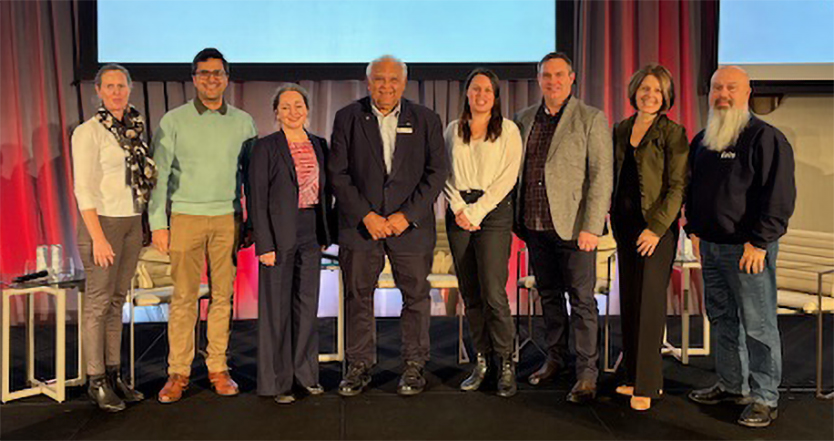Inaugural Tri-Academy Partnership fosters Indigenous knowledge sharing across borders
- 4 mins read


The Australian group attending the Tri-Academy Partnership on Indigenous Engagement were (from left) Lynn Allan from the Australian Academy of Science, Dr Jordan Pitt, Michelle Hobbs, Professor Tom Calma, Dr Katrina Wruck, Professor Ray Lovett, Anna-Maria Arabia, and Professor Bradley Moggridge.
On the unceded territories of the xʷməθkwəy̓əm (Musqueam), Skwxwú7mesh (Squamish), and səlilwətaɬ/Selilwitulh (Tseil-Waututh) nations in Vancouver Canada, Indigenous scholars, academics and allies from across three nations came together for the inaugural Tri-Academy Partnership on Indigenous Engagement, which took place from 4 to 6 November.
Hosted by the Royal Society of Canada in collaboration with the Australian Academy of Science and the Royal Society of New Zealand Te Apārangi, the Tri-Academy Partnership inaugural summit was centred around the theme of cultural heritage in an era of reconciliation. It provided valuable opportunities for deeper understanding, knowledge sharing and connections between Indigenous scholars and academics from Australia, Aotearoa New Zealand and Canada, as well as non-Indigenous allies and stakeholders.
The three-day event saw panel discussions and keynote addresses from leading knowledge holders from the three countries, including Kungarakan Elder and Iwaidja man Professor Tom Calma AO FAA, representing the Australian Academy of Science and Ngiyampaa/Wongaibon epidemiologist Professor Ray Lovett from the Australian National University who participated in a panel discussion about the future of Indigenous engagement in academia. Discussions took place around the current state of Indigenous engagement in the academic sector, and how the sector and learned academies can improve and meaningfully engage with Indigenous knowledge and leadership.
Great opportunities
Professor Calma, a member of the Tri-Academy Partnership steering committee, said “I think there are some great opportunities coming out of forums like this between our three countries, on a number of different levels.
“[There is] the knowledge exchange that takes place here at the summit but also the contacts that we are able to make with each other.
“I've already made contacts with quite a number of our Canadian delegates who are here, both on language and on teaching, and learned a bit about their current projects.
“We have got to establish a global network of like minds, and the academies are a great example of where we can get those like minds together to share information and to learn from each other.”
Along with Professor Calma and Professor Lovett, the Australian delegation to Canada included distinguished scientists Dr Jordan Pitt, a Birri Gubba man and Chair of the Academy’s Early- and Mid- Career Researcher Forum; Michelle Hobbs, a descendent of the Bidjara people and 2023 joint recipient of the Academy’s Aboriginal and Torres Strait Islander Scientist Award; and Kamilaroi man Professor Bradley Moggridge and Mabuigilaig and Goemulgal woman Dr Katrina Wruck – both Indigenous advisers to the Academy’s Reconciliation Action Plan working group.
“Many of the issues Indigenous academics raised were common to all three nations,” Dr Jordan Pitt said, reflecting on the summit.
“Fundamentally these issues are all rooted in the same thing – the significant power imbalance between Indigenous communities and the academic community that seek to engage them.
“This has resulted in previous engagement being a purely extractive process which has eroded trust.
“While there is movement to improve engagement by moving from projects done ‘on us’ to projects done ‘with us’ and ‘by us’, to do so will require long-term and strategic engagement of Indigenous communities to move from merely nice-to-have representation to genuine partnership,” he said.
This event will help build understanding across academies, borders and cultures. We are also proud to have supported the attendance of EMCR delegates Dr Jordan Pitt (@jpapitt below), Michelle Hobbs (@MichyPossum) and Dr @KatrinaWruck. #TAP2024 pic.twitter.com/xtQLE8obRl
— Australian Academy of Science (@Science_Academy) November 6, 2024
Genuine Indigenous engagement
The summit was also attended by Anna-Maria Arabia, Chief Executive of the Academy.
“The Tri-Academy Partnership on Indigenous engagement was a tremendous opportunity to listen carefully about how our academies can understand and act upon our responsibilities toward genuine Indigenous engagement,” Anna-Maria Arabia said.
The Tri-Academy summit kicked off an initial three-year commitment to the gathering of Indigenous knowledge holders across the three countries, with the next summit to be hosted by the Royal Society of New Zealand Te Apārangi, and the third in Australia, hosted by the Australian Academy of Science.
“Already we are seeing the enthusiasm by members participating, knowing that this is really the start of a process for some in understanding how Indigenous practices occur in other countries,” Professor Calma said.





